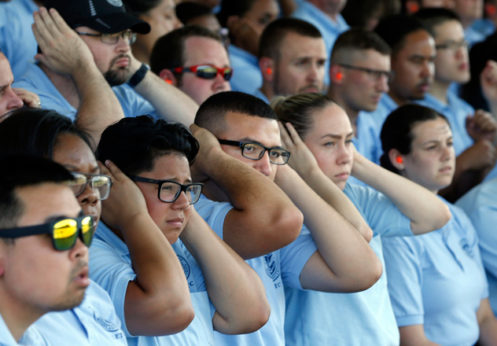
WASHINGTON (PAI) — The nation’s 42,000 Transportation Security Administration (TSA) employees, mostly airport screeners, are on the front lines of homeland security. However, winning equity and job security for themselves has been an ongoing struggle.
Last week, after months of hard bargaining, they have finally won a new collective bargaining contract that makes progress toward equal treatment.
The TSA officers joined AFGE (American Federation of Government Employees), which represents over 650,000 federal workers, in 2012. This is their second contract.
As federal employees, the officers are barred by law from negotiating pay levels, but they can bargain with the TSA over their rights on the job, job security, and – most important – grievance procedures, the process by which disputes with management are resolved.
On the table during the current negotiations were such issues as how job performance is evaluated and shifts are assigned, how much of an allowance workers receive for paying for their uniforms, and the selection process for special assignments.
Contract negotiations began in mid-2015. In August, when about half the contract issues were settled, TSA issued a “determination on collective bargaining” that changed some of the rules governing the interaction of the agency and the union.
For example, the determination made it more difficult for union members to conduct business during work hours and made the federal government itself responsible for making final decisions in disputes between the union and the TSA.
When the determination was issued, AFGE President J. David Cox told David Thornton of Federal News Radio, “This new determination proves once again that TSA is not interested in following the universally accepted norms of labor law. TSA wants to create a one-way relationship where the agency holds all of the cards, leaving TSA officers out to dry.”
Nevertheless, negotiations continued.
The employees rejected the first version of the contract that was presented to them for a vote because of TSA’s “unwillingness to agree to improvements in the terms and conditions of employment,” according to a statement by the union.
“We went back to the table to ensure the voices of the officers we represent were fully heard,” President Cox stated.
During the second round of talks, union negotiators won enough improvements to win approval from 85 percent of officers casting ballots.
The new pact takes effect on Jan. 7.
“TSA officers showed their professionalism and commitment to keeping the public safe when air travel was at a record high, and they did it all while their rights on the job hung in limbo,” President Cox said.

He continued, “There’s still a long way to go for officers to have the full rights as other federal employees, but this contract improves some terms and conditions” of their work.
Several issues that were not settled during the negotiations are going to be brought before a panel of independent arbitrators. These issues include rules governing the agency’s pay-for-performance system, performance awards, grievance procedures, arbitrations, and investigations. A panel of independent arbitrators will decide those issues.
“TSA Officers are veterans, former law enforcement officers, and middle class working people who shoulder a tremendous responsibility to keep the flying public and our nation safe,” said AFGE TSA Council 100 President Hydrick Thomas in a statement. They “deserve to be respected, supported, and valued by TSA management.”











